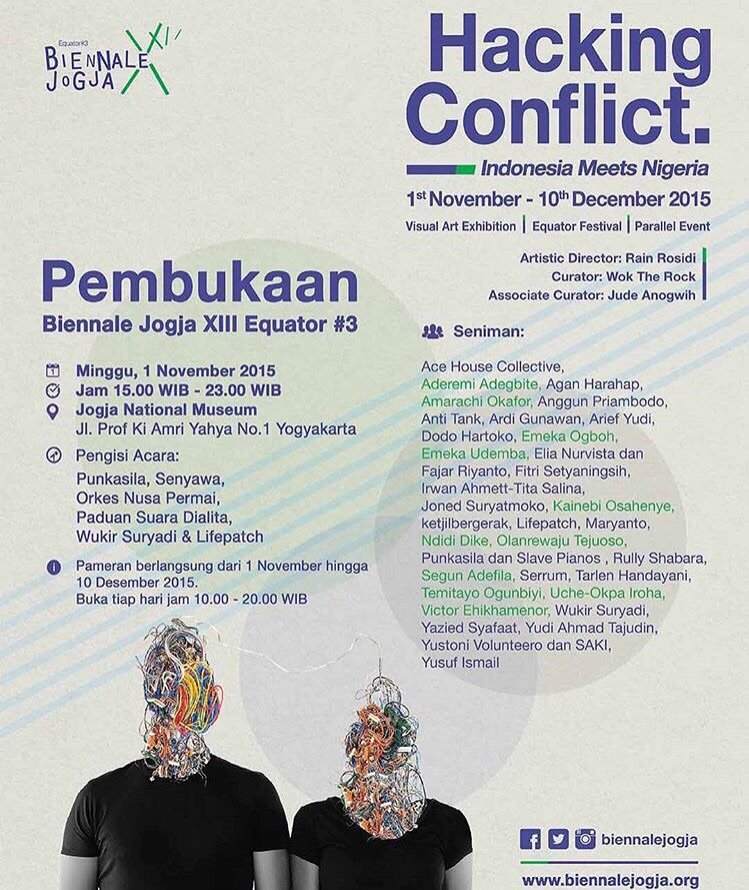Biennale Jogja XIII Equator #3: Hacking Conflict
Indonesia Meets Nigeria
July 2015
“Hacking Conflicts – Indonesia meets Nigeria” is the 3rd edition of the BJ Equator series, following the first edition in 2011 (India) and 2013 (five Middle East countries). Managed in a new vision and direction by Yogyakarta Biennale Foundation, the Equator series present a strategy that utilises the line the Equator draws around the globe as a concrete practice in exploring and re-reading the world, visioned and projected until the year 2022.
Under the theme “Hacking Conflicts – Indonesia meets Nigeria”, the Biennale will showcase the works of 23 Indonesian and 11 Nigerian artists presented in the Main Exhibition scheduled from 1st November to 10th December 2015. Under the curatorial guidance of Wok the Rock and the assistance of the Nigerian based curator, Jude Anogwih, the artists will engage the audience to conduct several experiments making use of conflict, chaos, misinterpretation and difference concerned with the unstable democracy practice addressed to both countries.
According to the curator, “Conflict always exists in the democracy since everyone has the right to speak. Hence, conflict should be considered positively. It is a principal thing in democracy that needs to be managed to achieve harmony we’ve never imagined.“
The key aspect of the Main Exhibition stands in its public intervention and engagement with the audience in order to create public opinion and involvement. The 34 artists will respond by creating site specific installations, interactive works, events, performances and visuals that will occupy the indoor and outdoor spaces of Jogja National Museum. Apart from making the exhibition venue an active space, the artists will collaborate both on the levels of exchanging and sharing their ideas, a process encouraged through the regular monthly meetings, online and offline, with the final aim to create synergy between the works and to stimulate conflicts.
This year 23 artists were selected from Indonesia: Ace House Collective, Agan Harahap, Ahmett-Salina (Irwan Ahmett-Tita Salina), Anggun Priambodo, Anti Tank, Ardi Gunawan, Arief Yudi the initiator of the Jatiwangi Art Factory, Dodo Hartoko, Elia Nurvista, Fitri Setyaningsih, Joned Suryatmoko, ketjilbergerak, Lifepatch, Maryanto, who recently exhibited at Gillman Barracks in Singapore, Punkasila, Rully Shabara and Wukir Suryadi, both renowned experimental musicians, Serrum, Tarlen Handayani, Yazied Syafaat, Yudi Ahmad Tajudin, the Theatre Garasi Director recently awarded with the Prince Claus distinction, Yustoni Volunteero, and Yusuf Ismail (Ucup)
Among the Nigerian artists are Aderemi Adegbite, Amarachi Okafor, Emeka Ogboh, the soundscape artist showcased at this year’s 56th Venice International Biennale curated by Okwui Enwezor, Emeka Udemba, Kainebi Osahenye, Ndidi Dike, Olanrewaju Tejuoso, Segun Adefila, Temitayo Ogunbiyi, Uche-Okpa Iroha, Victor Ehikhamenor.
Maryanto’s outdoor façade is certainly one of this year’s attractions. The artist will cover the entrance of the museum with a 40m long and 8m height artwork of the recurrent theme he has been exploring – the issue of natural resources and the unfair development of the oil production system encountered in both countries. During July and August, Maryanto had a residency in Lagos, Nigeria, together with Aggun Priambodo where they met the Nigerian artists and exchanged ideas and possible outcomes.
Other highlights of the exhibition include the theatre director Joned Suryatmoko who wishes to explore the junction between performing and visual arts in a Biennale context using a previous performance from 2013, Margi Wuta. He will create weekly guided tours for groups of maximum 10 people, blindfolded and guided by a blind person. The conflict here resides in the way we “see” the works, how to make people believe their existence, and in general how we experience such way of looking at art.
An interesting collaboration will be made between Elia Nurvista (IN) and Ndidi Dike (NG) for a site-specific project. Based on the government program of rice distribution to fortuneless people, Elia will re-enact through a series of events the rice distribution for the surrounding villagers, searching for possible conflicts that might appear. Ndidi is one of Nigeria’s leading female artists driving her inspiration from sources including globalization, migration and slavery. For the events project, she will give her input on the issue of food politic and distribution, finding ways on how to resolve the conflict encountered.
Punkasila (derived from “Pancasila”, the official philosophical foundation of the Indonesian state) is an artist group and band. As a response to the aggressive campaigns of the last year by using the motorbike mufflers in convoys, the young group will create new instruments using the muffler and engines into an experimental sound-site installation. The audience is invited to “take the power” over the sounds and participate together with the groups of campaigners in an organized convoy, costumed in the symbols of all political parties of Indonesia.
The highlight from the Nigeria side is the soundscape artist Emeka Ogboh presented at this year’s Venice Biennale. For Jogja Biennale he will contribute with one of his recent works, Lagos Soundscapes, a coronation of the bustling Nigerian metropolis and its audible expressions, incorporating the actual socio-political complexities and narrations of the country.
During October and November, a residency program is going to be done by 5 of the Nigerian artists in Yogyakarta.
About the Theme and Curators:
Hacking Conflict is taken as the theme of the Biennale after observing the shared history of both countries that faced colonialism and recent release from military regime. However, both were only truly free of authoritarian regimes at the end of the 90s. In Indonesia this was signified by the demise of the New Order regime in 1998. Nigeria is unique because its military regime was in fact ended by the military itself in 1999. After the fall of this authoritarian rule, the state and the people both speculated and experimented with democratic systems in seeking the ideal, autonomous form, each according to their understandings and desires. This has created a disharmonious gap in social and cultural infrastructure. The situation became even more chaotic within the understanding of a larger nation (consisting of various ethnicities, traditions and languages) with abundant natural resources.
In practice, individual freedom of speech and opinion for all of these people of diverse ethnicities and languages is a fertile field for the cultivation of opposition and conflict. In this, conflict must always be seen as a positive. Its existence must be invited and understood absolutely as something which must be managed in order to create unexpected harmony. However, in this context democracy is not merely seen at a political level but is also understood as a way of living together in all of our differences and our chaotic economic, social and technological infrastructure, based on the principles of living that society is currently experiencing. A strategic but speculative strategy is required to take apart this conflict, so that it can shift from asymmetrical to symmetrical patterns.
This is an appropriate thing to attempt through dissecting and presenting the bitter seeds of conflict and chaos through imaginative artistic and cultural work; dynamic and open to be enjoyed, contemplated and deconstructed together.
The curatorial team for the Biennale Jogja XIII is formed by Alia Swastika as the Director, Rian Rosidi (Artistic Director), an independent curator and lecturer at the Art Institute of Yogyakarta (ISI), Woto Wibowo aka Wok the Rock (Curator) currently the Director of MES56 Art Space that focuses on the development of contemporary photography, and Jude Anogwih (Associate Curator) from the Centre for Contemporary Art in Lagos, Nigeria. The curators will work together in the implementation of the main programs of the BJXIII.
(From press information)

